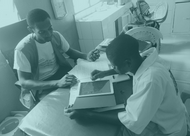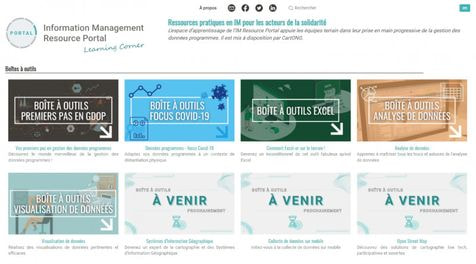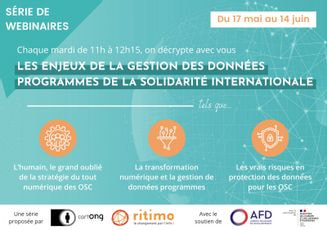Strengthening program data management: initial assessment

In short, the idea was to help them improve their practices regarding the use and implementation of methods, tools and processes related to the different stages of the data analysis chain.
More than 2 years in, where do we stand? What are the latest implemented initiatives and published resources? What is planned for the last 8 months of the project? Using the more casual format of an interview, here is a short update.
Firstly, where do we stand on the project today?
A lot has happened in the last two years, but, in short we can say that the first year of the project was marked by the release of the study on the practices and needs of CSOs in terms of Information Management (September 2020), and the second one saw the launch of the IM Resource Portal (June 2021), which is central to ensuring CSOs can easily access all the key resources they need to better navigate data management.
Beyond that, we can mention that, so far, 7 CSOs have been directly supported via this project, 4 inter-CSO exchange days have been organized, 10 studies and 7 toolboxes have been developed and released, and 182 external resources from our tech watch have been referenced on the portal. It’s fair to assume that we have been busy!
Two years ago, we were still debating if the topic should be called Information Management or program data management. Any progress on this?
This was indeed one of the most difficult aspects to tackle. We needed to clarify what we were talking about – first off, because “Information Management” was too wide a term for what we were talking of and it also didn’t translate well to French. What’s more, it was a very “humanitarian” term that did not speak to development CSOs. In the initial study of the project, we thus spent time clarifying the scope of what program data is – and also what it isn’t. It’s great to see today that the sector has matured on the topic, with “program data” now being used more and more frequently by francophone CSOs, which reveals to what extent it was and is a project reality. The two terms – IM and program data management – are still used interchangeably in our work, but at least now we all understand more clearly what stands behind it.
What were the most significant resources that have come out of this project so far to help aid actors structure their IM approaches?
Beyond the already-mentioned study on the Information Management practices and needs of CSOs, there have been many resources published as part of the project to help inform CSOs’ choices and approaches in terms of program data:
- A set of tools to help CSOs structure themselves in regards to the Human Resources component of program data;
- A study compiling recommendations – for CSOs, universities, training institutes and aid practitioners – for the improvement of data management training practices (in French only);
- Up-to-date comparative studies on various data technologies of the day (on Mobile Data Collection, remote survey-type data collection or digital feedback mechanisms, online mapping tools for beginners, and a checklist for the responsible selection of tools);
- Recordings of feedback sessions from a couple of more “mature” CSOs in terms of IM, namely Oxfam and WaterAid (to be found on our YouTube channel).
And on the more practical side?

We are very excited to have come out this January with a new dedicated section on the IM Resource Portal, called the Learning Corner. The Learning Corner is dedicated to supporting humanitarian and development field practitioners on their path to better data management. At this stage, it comprises the following toolboxes: Your first steps with program data, Program data -Covid-19 focus, On the field, I don’t analyze, I Excel! (in French only), Data visualization and Data analysis.
We will soon also migrate a couple of preexisting toolboxes on Mobile Data Collection and Geographical Information Systems (in French only) as well as publish the English version of the program data self-assessment methodology that we hope will be useful very widely!
Did you encounter any specific challenges up to now?
Like everyone, the Covid-19 pandemic – that kicked in not long after the start of the project – had a huge effect on the project. On the positive side, it put the topic of CSOs’ data practices in the spotlight as everyone was scrambling to continue collecting and analyzing data on ongoing activities from remote, as well as trying to tackle the new humanitarian situations it was entailing in different contexts of intervention. We were happy to support this effort by offering direct support to CSOs via our Covid-19 IM Help Center and through all the guidance that was produced in the Covid-19 toolbox and which aims at thinking through data collection in physical distancing contexts.
However, the sanitary crisis also – of course – led to us not being able to do all the in-person events, field missions and training sessions we had initially planned, which has had a huge impact on the quality of exchanges and the resonance the project has for harder-to-reach actors, such as smaller or local CSOs that are not part of the existings working groups or networks linked to the topic for example, as well as field teams of larger CSOs. At this stage, trying to increase the project reach is one of our priority focuses for the coming months to ensure all the already released resources come in useful to those who need them most!
Lastly, we can also mention that we feel that some of the underlying work to help structure CSOs in terms of program data is also made more difficult in a time of crisis, with aid actors being focused on more immediate subject matters. It is therefore important to give the topic of “program data” some time to trickle down, so that CSOs can approach and digest it according to their own operational needs.
The project is ending this year. Can you give us an overview of some of the key aspects we should be getting excited about?
In terms of resources, the main focus will be on practical resources, such as translating existing toolboxes, as well as publishing some training material on different IM topics of the day. We will also be adding a last component on evaluating the IM dimension of humanitarian and development projects in the Information Management Self-Assessment Methodology.

We are also excited that the Crisis and Support Center of the French Ministry of Europe & Foreign Affairs has decided to support CartONG on the question of improving CSOs’ responsible data practices by financing a project dedicated to the topic. It is indeed very much a key stake of the day for the sector, as we see daily with the current Ukraine crisis. This new two-year initiative will allow us – amongst other things – to create a responsible data management toolbox that, we hope, we’ll serve as an entry point on the topic for francophone CSOs.
Beyond this, we are organizing a number of events to help keep the conversation on the topic going between aid actors – as experience sharing is a key component of building lasting and sound program data management practices. In addition to the francophone CSOs’ exchange days (you can find all the details about the upcoming Exchange Days here), we will be running a series of talks around the stakes of the day with RITIMO (in French) between mid-May to mid-June, such as on the misconceptions around Open Data and open source, the true risks for CSOs in terms of data protection, on the specificities for program data of digital transformation and such.
Last but not least, at the GeOnG forum in October, we will also be wrapping up the project by presenting its main findings.